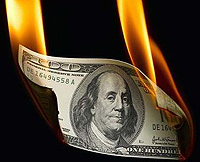 President Obama has pledged more of your money to protect the unions and secure their vote. The administration demanded and got $26 billion taxpayer dollars to spare 300,000 teachers and other public workers from the unemployment lines.
President Obama has pledged more of your money to protect the unions and secure their vote. The administration demanded and got $26 billion taxpayer dollars to spare 300,000 teachers and other public workers from the unemployment lines.
The hundreds of billions of taxpayer money already spent by Obama and the Democrats since 2009 to pay off their union supporters was apparently not enough. Despite giving $100 billion in new funding to the Department of Education (DOE), courtesy of The American Recovery and Reinvestment Act (ARRA) of 2009, in addition to the $25 billion bailout that saved the GM and Chrysler auto union workers, more is needed to thank them for their continuing support and unquestioning loyalty.[Read more…]

